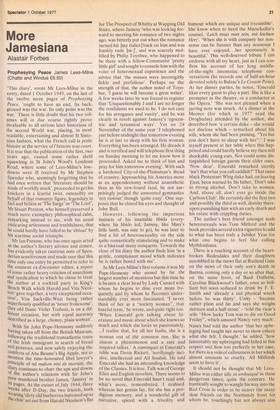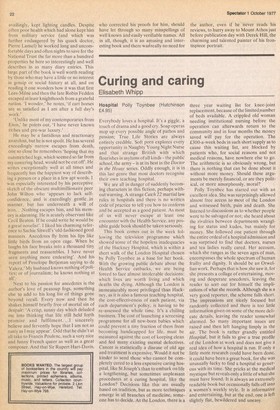More Jamesiana
Alastair Forbes
Prophesying Peace James Lees-Milne (Chan° and Windus £6.50) 'This diary', wrote Mr Lees-Milne in the entry, dated 1 October 1945, on the last of the twelve score pages of Prophesying• Peace, 'ought to have an end. Its background was the war. Its only point was the war.' There is little doubt that his two volumes will in due course rightly prove invaluable to all serious later historians of the second World war, placing, in most readable, entertaining and almost St SirnoMan fashion, what the French call la petite histoire at the service of l'hisioire tout court. It is true that the publication of the first, two years ago, caused some rather shrill squawking in St John's Wood's Loudoun Road, where some of Lees-Milne's lowdowns were ill received by Mr Stephen Spender who, seemingly forgetting that he had once written that 'literature should be made of worldly muck', proceeded to get his knickers in a fearful twist, ostensibly on behalf of that romantic figure, legendary in fact and fiction as 'The Serge' or 'The Loot', Mr Stuart Preston, who himself preserved a much more exemplary philosophical calm, remarking instead to me, with his usual endearing artlessness and truthfulness, that he could hardly have failed to be `ebloui' by his wartime social triumphs.
Mr Ian Parsons, who has once again acted as the author's literary advisor and censor, has evidently taken cautious note of Spenderian sensitiveness and made sure that this time only one entry be permitted to refer to the eminent ex-Encounter editor, a report Of some rather heavy criticism of anarchism and syndicalism to which he chose to treat the author at a cocktail party in King's Bench Walk which Harold and Vita Nicolson 'gave together, a very exceptional occasion', Vita Sackville-West being rather superflously qualified as 'never frolicsome', (her old ,flame Violet Trefusis, is on a different occasion, but with equal accuracy described as a large, clumsy, plain woman'.
With Sir John Pope-Hennessy suddenly having taken off from the British Museum, following the traditional transatlantic route of the Irish immigrant in search of bread and potatoes, and now safely enjoying the Comforts of Abe Beame's Big Apple, not to mention the time-honoured libel lawyer's Principle of nil malum nisi de mortals, the diary continues to chart the ups and downs of the author's relations with Sir John's Poor murdered brother James, 'Jamesy' in its pages. At the outset of July 1944, three Weeks after D-Day, the two friends, both Wearing 'dirty old burberries buttoned up to the chin' set out from Harold Nicolson's flat for The Prospect of Whitby at Wapping Old Stairs, where Jamesy 'who was looking forward to meeting his romance of two nights ago, was bitterly put out when the romance turned his [my italics] back on him and was frankly rude Isle r, and was scarcely mollified by Philip Toynbee, who happened to be there with a fellow-Communist 'pretty little girl' and sought to console him with the voice of heterosexual experience and the advice that 'the masses were incorrigibly fickle and perfidious'. Perhaps on the strength of that, the author noted of Toynbee, 'I guess he will become a great writer'. A few weeks later he was forced to register that 'Unquestionably J and I are no longer the confidants we used to be. I do not care for his arrogance and vanity', and he was clearly in revolt against Jamesy's 'egocentric and tyrannical ways'. Yet on 24 November of the same year telephoned just before midnight that tomorrow evening he is at last to sleep with his first woman. Everything has been arranged. He dreads it and is terrified and will telephone first thing on Sunday morning to let me know how it proceeded. Asked me to think of him and pray for him tomorrow evening'. With such a hardened City-of-the-Plainsman's dread of country, 'approaching his America more as an appendectomy without anaesthetic than as his new-found land, he not surprisingly judged the unwonted gymnastics 'not riotous' though 'quite easy'. One supposes that he closed his eyes and thought of John Bull.
However, following the imperious instincts of his insatiable libido (everywhere his libido led, Jamesy, like Mary's little lamb, was sure to go), he was later to find a bit of heterosexuality on the side quite romantically stimulating and to make as a bisexual many conquests. Towards the close of his diary the author finds him 'in a gentle, complaisant mood which indicates he is rather bored with me'.
In Mr Lees-Milne's first volume it was Mr Pope-Hennessy who scored by far the largest number of mentions but this time he is beaten a clear head by Lady Cunard with whom he begins to dine ever more frequently and by whom he ecomes understandably ever more fascinated. 'I never think of her as a "society woman", that hateful term,' he wrote, and quite right too. 'When Emerald gets talking about literature and music about which she knows so much and which she lov'es so passionately, ...I realise that, for all her faults, she is a woman out of the common run. She is almost a phenomenon and a rare and inspired talker.' A stammgast at Emerald's table was Denis Rickett, 'terrifyingly incisive, intellectual and All Soulish. He told Emerald she had an astounding knowledge of the Classics. It is true. Talk was of George Eliot and English novelists. There seems to be no novel that Emerald hasn't read and, what's more, remembered. I realised wherein her genius lay, for she has a prodigious memory, and a wonderful gift of narrative, spiced with a frivolity and humour which are unique and irresistible'. She knew when to heed the Marschallin's counsel, Teich muss man sein, mit leichten Herz'. 'When she is with company her nonsense can be funnier than any nonsense I have ever enjoyed. . her spontaneity is beautiful.' This well-deserved tribute I can endorse with all my heart, just as I can confirm his account of her long middleof-the-night insomniac telephone conversations (he records one of half-an-hour devoted solely to Balzac's Le Cousin Pons). At her dinner parties, he notes, 'Emerald likes every guest to play a part. She is like a prompter in the theatre, or a conductor at the Opera.' She was not pleased when a jarring note was struck. At a dinner at the Moores (for which in 1977 read the Droghedas) attended by the author, she described how 'a certain duke — she would not disclose which — remarked about his wife, whom she had been praising, "Yes but you don't have to sleep with her".' I was myself present at her table when this happened and could hardly believe my then still shockable young ears. Nor could some distinguished foreign guests their older ones. 'Now dear', Emerald remarked sternly 'isn't that what you call caddish?' That same black Protestant Whig duke had, on leaving Eton, been warned by his father, 'Don't take to strong alcohol. Don't take to women. And, above all, don't ever go inside the Carlton Club'. He certainly did the first two and possibly the third as well, destiny thereupon punishing him with an early death and his estate with crippling duties.
The author's best friend amongst male heterosexuals was Tom Mitford and the book provides several extra vignettes to add to what has been truly a Jubilee Year for what one begins to feel like calling Mythfordiana.
There is a touching account of the heartbroken Redesdales and their daughters assembled in the mews flat at Rutland Gate on the news of their only son's death in Burma, coming only a day or so after that, on the same front, of Basil Dufferin, Caroline Blackwood's father, once so brilliant but soon seduced to drink by F. E. Smith and 'already a sad physical wreck before he was thirty'. Unity — 'became rather plain and fat and says she weighs thirteen and a half stone' — 'told the vicar's wife "How lucky Tom was to die on Good Friday", which amused Nancy very much'. Nancy had told the author 'that her upbringing had taught her never to show others what she felt. I thought,' he added, 'how lamentably my upbringing had failed in this respect and how too perfectly in her case, for there is a vein of callousness in her which almost amounts to cruelty. All Mitfords seem to have it'.
It should not be thought that Mr LeesMilne was either idle or embusque in these dangerous times; quite the contrary. He frantically sought to wangle his way into the Red Cross in order to be nearer the many dear friends on the Normandy front for whom he, touchingly but not always alas availingly, kept lighting candles. Despite often poor health which had alone, kept him from military service (and which was further endangered by his quack doctor, Pierre Lansel) he worked long and uncomfortable days and often nights to save for the National Trust the far more than a hundred properties he here so interestingly and well describes in as many diary entries. This large part of the book is well worth reading by those who may have a little or no interest in gossip or social history at all, and on reading it one wonders how it was that first Lees-Milne and then the late Robin Fedden escaped at least knighthoods from a grateful nation. 'I wonder,' he notes, 'if cart horses are as satisfied as I am after a full day's work.'
most of my contemporaries from Lion,' he points out, 'I have never known riches and pre-war luxury.'
I le may be a fastidious and reactionary an a t chist, but he is not spoilt, He has several exckerlingly narrow escapes from death, one so close he remembers 'hoping that my outstretched legs, which seemed so far from my cowering head, would not be cut off'. He writes exceptionally well at all times and frequently has the happiest way of describing a person or a place in a few apt words. I was especially interested by his perceptive sketch of the obscure multimillionaire peer John Wilton who 'appears to lack selfconfidence, and is .exeedingly gentle, in manner, but has underneath a will of iron. . .Nothing escapes him, and his memory is alarming. He is acutely observant like Cecil Beaton. If he could write he would be a great novelist'. I liked his charming reference to Sachie Sitwell's 'old-fashioned good manners. Anecdotes fly from his lips like little birds from an open cage. When he laughs his face breaks into a thousand tiny fragments and reassembles. I have never seen anything more endearing'. And his report of Penelope .Betjeman saying to de Valera,' My husband knows nothing of politics; or of journalism; he knows nothing at all'.
. Next to his passion for anecdotes is the author's love of peasoup fogs, something else to add to his long list of things gone beyond recall. Every now and then he shakes .himself briefly free of mortal sin of despair: 'A crisp, sunny day which deluded me into thinking that life still ,held forth promise and fulfilment. . .1 sincerely believe and fervently hope that I am not as nasty as I may appear'. Odd that he didn't at all take to Francis Poulenc, such a very nice and funny French queer as well as a great composer. And that Sir Rupert Hart-Davis, who corrected his proofs for him, should have let through so many misspellings of well known and easily verifiable names. All in all, though, it is an amusing and interesting book and there waJreally no need for the author, even if he never reads his reviews, to hurry away to Mount Athos just before publication day with Derek Hill, the charming and talented painter of his frontispiece portrait.



































 Previous page
Previous page